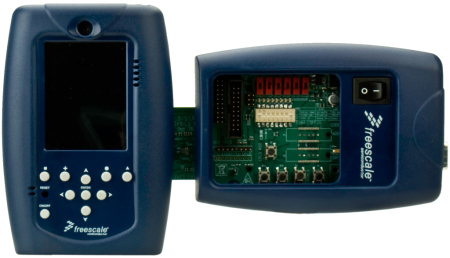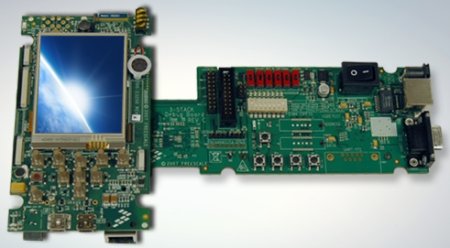Development kit adds “personality” to ARM9 SoC
Jan 13, 2009 — by Eric Brown — from the LinuxDevices Archive — 6 views Freescale Semiconductor is shipping a product development kit (PDK) for its ARM9-based i.MX27 system-on-chip (SoC). The kit includes a CPU module, a “Personality” (peripherals) module, a debugging device, and board support packages (BSPs) for either Linux or Windows CE, says the company.
Freescale Semiconductor is shipping a product development kit (PDK) for its ARM9-based i.MX27 system-on-chip (SoC). The kit includes a CPU module, a “Personality” (peripherals) module, a debugging device, and board support packages (BSPs) for either Linux or Windows CE, says the company.
Like Freescale's i.MX31 PDK released last June, the i.MX27 kit takes a modular approach, offering three separate, reusable modules that work together. The company says it plans to provide similar modular PDKs for its other major processors, which should eventually include its newly announced, netbook-oriented i.MX515 SoC.


Personality module (l) and Debug module (r)
(Click front or bottom view to enlarge)
The heart of the kit is the CPU module containing the i.MX27 processor, which debuted in 2007. The SoC is said to be designed for applications including intelligent remote controls, point-of-sale terminals, and cordless or mobile phones with video- and voice-over- IP (V2IP) capabilities.
Like the earlier i.MX21, the i.MX27 is based on an ARM926EJ-S core clocked at 400MHz. The i.MX27 inherits many of the i.MX21's on-chip peripherals and peripheral interfaces, facilitating software portability. Built on 90nm technology, the i.MX27 added on-chip video acceleration, more storage interfaces, and a 10/100 Ethernet port to the basic i.MX21 design.

Personality module (left, with CPU module embedded) and Debug module (right), unpackaged
The PDK's CPU module is equipped with the i.MX27 processor, 128MB DDR SDRAM, and 256MB NAND flash. The module also offers Freescale's MC13783 power management IC, as well as audio, USB, and touch interfaces, says the company.
The Personality module is a “demo-ready” peripherals board that supplies typical end-product features such as touchscreen displays, Ethernet, USB, WiFi, Bluetooth, camera, and even accelerometers. Freescale is releasing only one general-purpose Personality module, but design files, schematics, gerbers, BOM, and other materials are said to be supplied, so customers can create their own Personality boards.



CPU, Personality, and Debug modules
(Click any to enlarge)
The Debug module, meanwhile, is designed for development access, and offers serial, Ethernet, and JTAG interfaces. The module is supported by ARM's Real View ICE and Multi-ICE technologies, says Freescale.
Specifications listed for the i.MX27 PDK modules include:
- i.MX27 Applications Processor Module:
- i.MX27 SoC
- 128MB DDR SDRAM
- 256MB NAND flash
- Power management (PMIC MC13783) and power circuitry
- Audio
- HS USB PHY
- Touch controller
- Connector
- Personality Module:
- 2.7-inch TFT display
- SD card, ATA HDD interface
- 10/100 Ethernet port
- Connectivity — FM, 802.11 WiFi, Bluetooth, USB OTG, USB HS
- Accelerometer (Freescale MMA7450L)
- User I/O
- Button
- 2-megapixel camera module
- External connectors — dock, headphones, TV out, GPS
- Microphone
- Speaker
- Debug Module:
- Debug Ethernet port
- Debug serial port
- JTAG
- Reset, interrupt, boot switches
- Debug LEDs
- CodeTest interface
- Power source
- Current/power monitoring
The i.MX27 PDK includes a Linux or Windows Embedded CE 6.0 BSP, as well as a multimedia framework, and demo applications, says Freescale. The BSP comes with multimedia codecs provided as “product-ready” software packages aimed at specific use cases, including audio/video playback, audio/video record, or image capture/display. Initially, the BSP will offer drivers for Ethernet and USB, but in a future release, Freescale plans to add Bluetooth, WiFi, and ATA drivers. The Linux BSP includes a 2.6.22 kernel, but the company plans to move up to Linux 2.6.26 later this year. The company also promises to continue to maintain and upgrade the BSPs to keep up with industry standards.
Availability
The i.MX27 PDK is available now for $1,500, including the BSPs and technical support, says Freescale. More information may be found here.
This article was originally published on LinuxDevices.com and has been donated to the open source community by QuinStreet Inc. Please visit LinuxToday.com for up-to-date news and articles about Linux and open source.